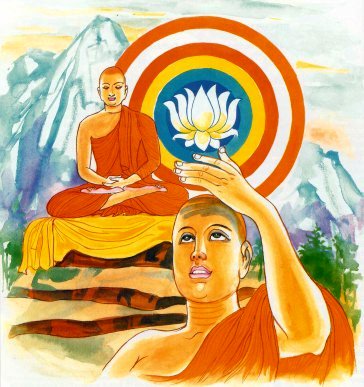Oneself is refuge of oneself,
who else indeed could refuge be?
By good training of oneself
one gains a refuge hard to gain.
Explanation: The saviour of oneself is one’s own self. What other person could be your saviour? This is a difficult kind of help – being your own saviour. It can be achieved only through self discipline.
The Story of the Mother of Kumarakassapa (Verse 160)
While residing at the Jetavana Monastery, the Buddha spoke this verse, with reference to the mother of Kumarakassapa.
Once, a young married woman asked permission from her husband to become a nun. Through ignorance, she went to join some nuns who were the pupils of Devadatta. This young woman was pregnant before she became a nun, but she was not aware of the fact at that time. But in due course, the pregnancy became obvious and the other nuns took her to their teacher Devadatta. Devadatta ordered her to go back to the household life. She then said to the other nuns, “I have not intended to become a nun under your teacher Devadatta; I have come here by mistake. Please take me to the Jetavana Monastery, take me to the Buddha”. Thus, she came to the Buddha. The Buddha knew that she was pregnant before she became a nun and was therefore innocent; but he was not going to handle the case. The Buddha sent for King Pasenadi of Kosala, Anathapindika, the famous rich man, and Visakha, the famous donor of the Pubbarama Monastery, and many other persons. He then told Elder Upali to settle the case in public.
Visakha took the young woman behind a curtain; she examined her and reported to Venerable Upali that the woman was already pregnant when she became a nun. Venerable Upali then declared to the audience that the woman was quite innocent and therefore had not soiled her morality slid.
In due course, a son was born to her. The boy was adopted by King Pasenadi and was named Kumarakassapa. When the boy was seven years old, on learning that his mother was a nun, he also became a samanera under the tutelage of the Buddha. When he came of age he was admitted to the Sangha; as a monk, he took a meditation topic from the Buddha and went to the forest. There, he practiced meditation ardently and diligently and within a short time attained arahatship. However, he continued to live in the forest for twelve more years. Thus his mother had not seen him for twelve years and she longed to see her son very much.
One day, seeing him, the mother nun ran after her son weeping and calling out his name. Seeing his mother, Kumarakassapa thought that if he were to speak pleasantly to his mother she would still be attached to him and her future would be ruined. So for the sake of her future (realization of Nibbana) he was deliberately stern and spoke harshly to her: “How is it, that you, a member of the sangha, could not even cut off this affection for a son?” The mother thought that her son was very cruel to her, and she asked him what he meant. Kumarakassapa repeated what he had said before. On hearing his answer, the mother of Kumarakassapa reflected: “O yes, for twelve years I have shed tears for this son of mine, yet, he has spoken harshly to me. What is the use of my affection for him?”
Then, the futility of her attachment to her son dawned upon her and then and there, she decided to cut off her attachment to her son. By cutting off her attachment entirely, the mother of Kumarakassapa attained arahatship on the same day. To them the Buddha said, “Monks! In trying to reach the deva world, or in trying to attain arahatship, you cannot depend on others, you must work hard on your own.”

